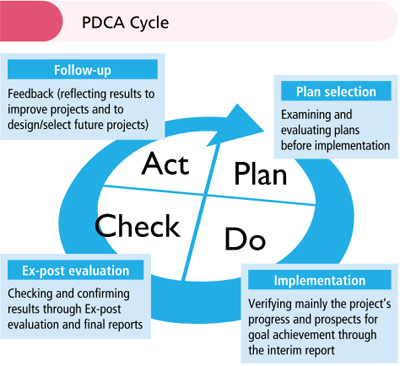(3) Conducting Evaluation

In order to enhance the transparency of ODA projects and to improve its accountability, Japan has been working on the thorough implementation of the following measures: (i) enhancing the PDCA cycle (project formation (Plan), implementation (Do), evaluation (Check), follow-up activities (Act)), (ii) strengthening the Program Approach, and (iii) reinforcing “visualization.”
With regard to enhancing the PDCA cycle, the ongoing efforts include: (i) formulating Country Development Cooperation Policies for all recipient countries of Japan’s ODA, (ii) convening the Development Project Accountability Committee, (iii) setting indicators for individual projects, and (iv) strengthening the evaluation mechanism.
In order to implement ODA projects more effectively and efficiently, strengthening of the PDCA cycle not only at the project level but also at the policy level is required. To this end, MOFA conducts policy evaluations(Note9) of economic cooperation policies based on the “Government Policy Evaluations Act (GPEA)”, as well as ODA evaluations by third parties who approach the evaluation from a neutral position. The recommendations and lessons obtained from these evaluations are reflected in ODA policy to further improve ODA management.
Third-party evaluations(Note10) are mainly carried out at the policy-level (e.g. country assistance evaluations and Thematic/Aid-Modality evaluations). They evaluate from development viewpoints based on three evaluation criteria, namely, whether the policies and programs are consistent with Japan’s high-level ODA policies and the needs of the aid recipient countries (relevance of the policies), whether the initial goals have been achieved (effectiveness of the results), and whether an appropriate process has been taken for the implementation of the policies (appropriateness of the process). In addition to evaluations from development viewpoints, evaluation is also conducted based on diplomatic viewpoints, considering the importance of verifying the diplomatic impact of implemented policies and programs. Since FY2015, basically all of MOFA’s third-party evaluations have been conducted using the diplomatic viewpoint, and efforts are underway to improve evaluations from those viewpoints in order to clarify the diplomatic importance and impact of ODA (how Japan’s ODA has contributed to realizing its national interests). Furthermore, all evaluation reports are made available to the public on the MOFA website (https://www.mofa.go.jp/policy/oda/evaluation/index.html) and this plays a role in fulfilling accountability to the public on how ODA has been used and what effects it has produced.
Moreover, JICA also conducts evaluations on respective projects of grant aid, ODA loan and technical cooperation, as well as thematic evaluations on each project. JICA conducts consistent monitoring and evaluation from the ex-ante stage to the implementation, and ex-post stages for each project, and has established a coherent evaluation mechanism for these three aid modalities. These evaluations are conducted in accordance with the DAC Criteria(Note11) for Evaluating Development Assistance, and for projects that exceed a certain cost, post-project evaluations by third party evaluators (external evaluations) are carried out. JICA also strives to enhance impact evaluations (Note12), recognizing the importance of quantitative examination of the effects of their projects.
Furthermore, as an example of how Japan’s ODA is viewed abroad, according to the Opinion Poll on Japan(Note13) conducted among ASEAN member countries in February 2018, nearly 80% answered, “Japan’s ODA is beneficial to my country.”
- Note 9: Ex-ante evaluations are conducted on loan aid projects, in which the maximum amount of loan offered through an Exchange of Notes (E/N) is 15 billion yen or more, and on grant aid projects, in which the maximum amount of aid offered through an E/N is 1 billion yen or more. Ex-post evaluations are conducted on “pending projects” and “incomplete projects” (“Pending projects” are projects for which the loan agreement has not been signed or loan disbursement has not begun after five years have elapsed following the decision to implement the project. “Incomplete projects” are projects for which loan disbursements have not been completed after ten years have elapsed following the decision to implement the project.)
- Note10: Regarding Grant Aid implemented by MOFA, since 2017 an internal evaluation is carried out for projects of 200 million yen or more, and a third-party evaluation is carried out for projects of 1 billion yen or more. The results of these evaluations are publicized, and utilized to improve the formation of future ODA proposals.
- Note11: The five criteria of relevance, effectiveness, efficiency, impact and sustainability. In December 2019, “coherence” was added and it became a total of six evaluation criteria.
- Note12: Evaluation method verifying the effects of development projects by using methods from statistics and econometrics.
- Note13: MOFA commissioned a polling institute and conducted an opinion poll on Japan, which targeted 300 individuals between the ages of 18 and 59 residing in 10 ASEAN countries (Brunei, Cambodia, Indonesia, Laos, Malaysia, Myanmar, Philippines, Singapore, Thailand, and Viet Nam) using both the internet and interviews with some selected individuals.
URL: http://www.mofa.go.jp/mofaj/press/release/press4_006943.html (in Japanese only)
